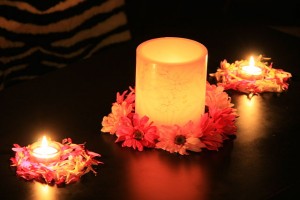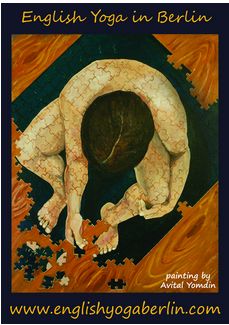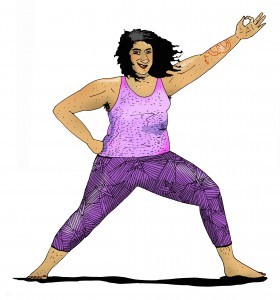
Relaxing by candlelight
Whether you celebrate Kwanzaa, Hanukkah, Christmas, Yule, or Dōngzhì, or no religious-cultural festival at all, the months of November and December in the Northern Hemisphere can be a stressful time of year. Winter is starting to hit hard, the hours of light dwindling down to their shortest, and the temperature is dropping. Additional stresses can wear us down; such as family or work social obligations, exams, deadlines, trip-planning, and attempts at tying up our own loose ends or goals for the year. Our hibernation impulse kicks in, and we want to stay inside where it’s warm and snack on comfort food.
At English Yoga Berlin we are offering a special 6-week Restorative Yoga course to help you alleviate winter stresses and regenerate your self-care, ending with a special class on December 21st, the winter solstice. Just in time for the daylight hours to start increasing again.
When: Sundays 6-7:30pm, Nov. 16 through Dec. 21, 2014.
Where: Our Kreuzberg Yoga Studio
Price: 100€ for the whole course / 20€ per drop-in class
registered monthlies 90€ / 2 stamps on a 5er card
Please contact us for more info – (to register, bring half the fee in cash to the first class)
Why Restorative Yoga?
In our everyday lives, we are often encouraged to push further, achieve more, do more, be more social, be more productive, fill our days with activities and take on more work. It is easy to lose sight of our own capacities, our own limits, and we can push ourselves beyond them without nurturing the support structure that we need to maintain a healthy balance, inviting stress, anxiety, injuries or illness. A restorative yoga practice (as well as yoga nidra and other practices that focus on relaxation) can help to rejuvenate the body and mind after pushing too far, thereby fostering balance. Once we know our limits and have nurtured them we can then gently (and with support) test the waters and play at the edges.
Expanding our limits (and moving beyond our comfort zone) can cause great rewards such as opening our minds to new concepts, becoming more flexible or physically strong, and strengthening our empathy towards other people. But it’s not possible to find balance if all we feel is stress, low energy and burn out. Restorative yoga activates the parasympathetic nervous system, which is responsible for nurturing our bodies and restoring them to health. When we are in a rushed and high-energy state, our bodies activate the ‘sympathetic nervous system,’ which is responsible for releasing certain chemicals to keep us going, so that we can react quickly and do more within a shorter period of time – a state of fight-or-flight. These chemicals can linger in the body until the parasympathetic nervous system kicks in to counter them. And we can remain in this state long after the specific things that have caused us anxiety or stress have ended. This is why we sometimes feel that ‘relaxing’ (meeting friends, watching TV, reading a book) cannot rejuvenate us. We may have trouble sleeping or have anxious dreams, which only perpetuate the feeling of urgency, stress, and low energy.
What is Restorative Yoga?
The only way to counter these effects in our body is with complete and total concentrated relaxation. Activities that remove distractions, such as meditation, sitting by a fire, or going for a solitary walk can help. Yoga Nidra and Restorative Yoga are specifically designed to activate the parasympathetic nervous system, so that the body and mind can restore to balance. Restorative Yoga is based on the Iyengar tradition of using props to support the body during poses.
Some of these poses were adapted by Judith Lasater for a restorative practice, so that deep relaxation could occur by holding positions longer (up to 15 minutes) with the support of bolsters, blocks, chairs, pillows and blankets. The body is positioned in such a way that it is totally supported, without the need to either stretch the muscles or use their power. A restorative pose should be very very comfortable and relaxing so that the muscles of the body can decompress, and the mind can completely unwind, fostering the release of chemicals from the parasympathetic nervous system. The restorative yoga classes we provide at English Yoga Berlin incorporate a gentle flow, along with some chair-supported Hatha poses (beneficial for those needing to strengthen their bones and joints because of Osteoporosis or Arthritis), followed by long-held poses in a warm candlelit room, and accompanied by gentle pressure point massage.






